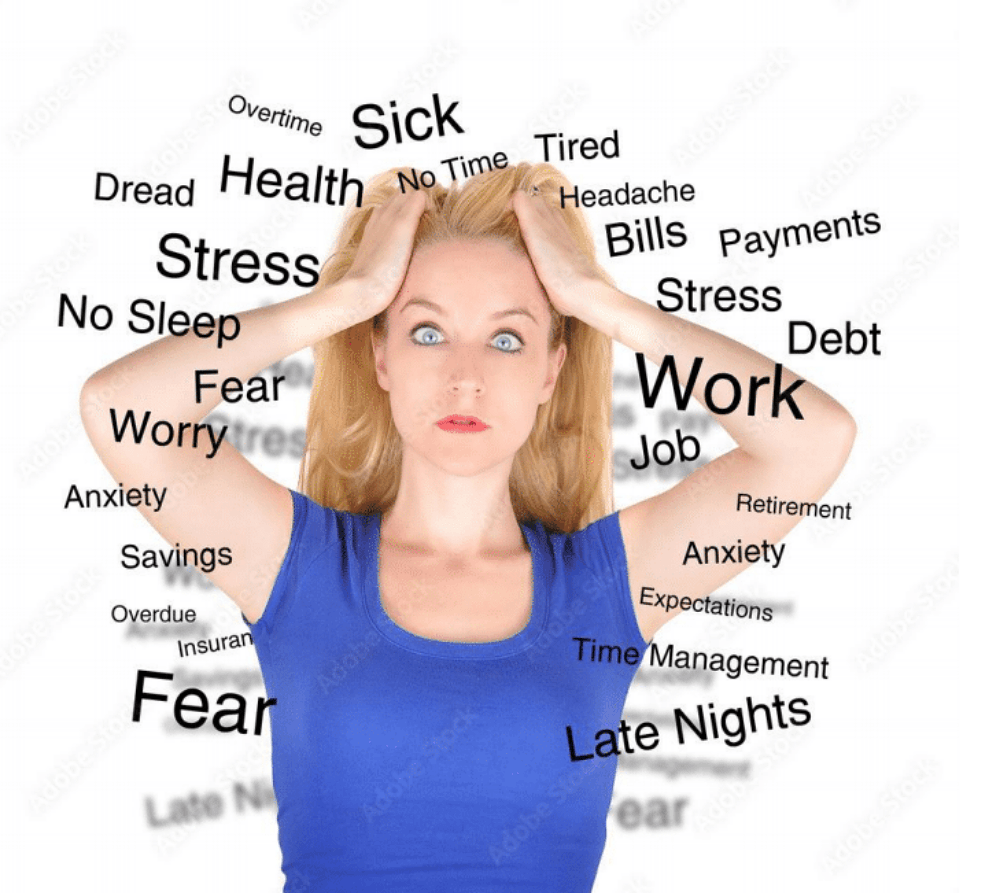Anxiety and stress can have multiple effects on your body and your brain. The overwhelming emotions that anxiety and stress cause can leave you feeling depleted, exhausted, and even sick. Worse yet, the thoughts behind them can lead to habits that create toxic cycles, which negatively impact your…
●Health
●Sleep
●Relationships
●Job
●Overall well being
These toxic patterns can run your life. However, once you become aware of the impact that anxiety and stress have on the body and brain, you can choose to disrupt the patterns.You can actually learn to release the stress and discover ways that lead to new thoughts and habits.
Discover what anxiety and stress are costing you…
Anxiety and Stress Can Get in the Way of Enjoying Life
As human beings, we are given a basic flight or fight response as well as freeze or fawn. This is for our survival. However, when we have chronic or long-term anxiety and stress, the response triggers a multitude of body responses that build up and create ways of feeling, thinking, and behaving that can get in the way of enjoying life—whether we realize it or not.
Unfortunately, when we live with anxiety and stress for months or even years, we become accustomed to the body’s response and try to “deal” with it as best as we can. Many of us use unhealthy methods that only add to the stress, like drinking or taking drugs. Others might try behavioral interventions that work for the short-term but never address the root cause of the stress.
Sadly, these methods don’t actually create lasting relief and often lead to guilt and shame. While we are able to break a habit or pattern for a time, the root causes are still buried within the unconscious and can be triggered without us even understanding how or why.
So, let’s uncover what anxiety and stress are doing to you.
Anxiety and Stress Do This to the Body
Ongoing anxiety and stress tax the body. They can cause…
- Headaches
- Sleep issues and insomnia
- Jaw clenching and teeth grinding
- Compulsive behaviors such as nail-biting and pacing
- Susceptibility to viruses and infections
- Loss of appetite or overeating
- Sweaty and cold feet and hands
- Shaky legs and hands
- Chest pain and rapid heartbeat
- Breathing problems
- Gastrointestinal issues, such as ulcers and IBS
- Skin and hair problems, such as rashes, acne, and hair loss
- Cardiovascular problems such as high blood pressures
- Ringing in the ear

In the middle of difficult situations (or our daily struggles with them), we often forget that these biological responses are connected to stress and anxiety in our lives.
Because these responses are uncomfortable, we try to get rid of them quickly, using unhealthy or ineffective methods. These methods/behaviors get locked in our brains, making it incredibly difficult to break the pattern and overcome anxiety and stress.
Let’s take a look at the impact that anxiety and stress have on the brain.
Anxiety and Stress Do This to the Brain…
Anxiety and stress disorders are the most common type of mental illness. Many do not know the impact anxiety and stress have on the brain. They can hyper-activate areas in our brains that can make us think we need to respond to various situations as if they are a real threat. Likewise, anxiety and stress can also inhibit the area of our brain that signals appropriate reactions, the area that manages fear. Therefore, we are unable to discern what is truly dangerous and what is not.
3 ways anxiety and stress impact our brains…
- Flood our brains with adrenaline and cortisol
If our brains are flooded with adrenaline and cortisol, the sympathetic part of our nervous system—the part that helps to calm us down is blocked. Over time, these hormones create a baseline level that is higher than it should be. So then, in theory, the day-to-day stress that should only cause mild anxiety actually causes significant anxiety. We then experience overwhelming emotions that are difficult to manage.
As a result, we cannot reach a state of calmness, and we cannot experience joy, peace of mind, hope, and our highest potential.
- Make us hyperactive and responsive to threats
The part of the brain called the amygdala is designed to manage emotions and moods. When we are under constant anxiety and stress, the amygdala sends out signals to fight or run (the fight or flight response). Over time, the hyperactive amygdala becomes hypersensitive and grows, sending out “false alarms.” Our emotions and moods become dysregulated, and we feel overwhelmed.
- Cause us to live in the past and hold onto negative memories
Anxiety and stress can trick the brain into holding onto negative memories. How? In short, stress lessens the ability of the brain to process and hold onto different aspects that come with learning something new—long-term memory. This sounds as if the brain would not be able to hold on to any memories, right? Unfortunately, anxiety tricks the brain into thinking memories related to anxiety are safe to store and should be remembered. So then, when under anxiety and stress, the brain holds onto the anxiety-provoking memories, and new events are blocked. Essentially, anxiety and stress wire the brain to remember failure, hopelessness, fear, and trauma. The happy, fulfilling, and positive-experience memories are buried deep in the brain but can’t break through until a “rewiring” occurs. They are there. They are simply hidden.
In Summary…
In summary, anxiety and stress create toxic thought patterns, physical ailments, and psychological responses that block you from experiencing hope, happiness, and peace of mind.
Even though anxiety and stress greatly affect your health, mental capacity, and potential for enjoying life to the fullest, your brain also can rewire self-defeating thought patterns and the body’s ability to revitalize itself.
Once you understand how and what anxiety and stress do to your body, you are open to trying the empowering tools that give you the ability to release the blockage.
We want you to know that there are evidence-based tools available to help you overcome anxiety and stress. They don’t have to run your life. You don’t have to let challenging situations, hardships, and self-defeating thoughts have the last word or be your life’s narrative. Take steps to overcome and live empowered today!

